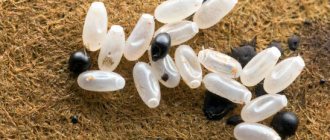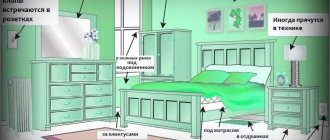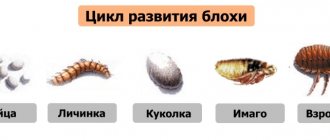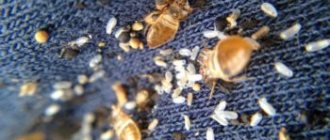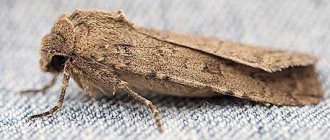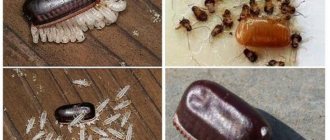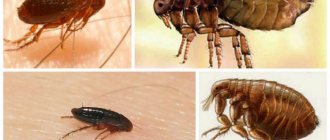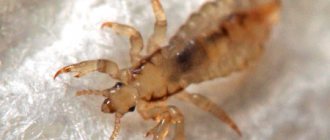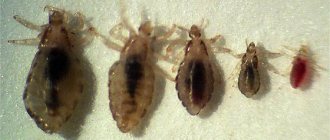If you find at least one adult bedbug in an apartment, rest assured: there are definitely eggs somewhere. How to destroy bedbugs at the initial stage of development to prevent further reproduction?
Compared to other parasites, bedbugs have a developed sense of smell and clear vision. This type of insect adapts even to unfavorable living conditions, and also develops a stable “immunity” to toxic chemicals. To eliminate bloodsuckers, you need to know for sure what their eggs and larvae are.
How to recognize a clutch, what the larvae look like
It is difficult to confuse a bug with another “domestic” bloodsucker: a small bug with a flattened body and a specific smell, usually hides in secluded places and comes out to hunt only under cover of night. Not everyone who has encountered this insect knows what bedbug eggs and larvae look like. Meanwhile, you can detect unpleasant cohabitation just by discovering clutches. So:
- the egg resembles a shiny grain no larger than 2 mm in size;
- has a cylindrical elongated shape;
- the color of the capsule is white, sometimes with a yellowish tint;
- at one end of the egg there is a formation that resembles a small cap.
Externally, the eggs of ectoparasites look like small translucent grains of rice.
But the larvae are similar to adults - they have the same body proportions, but they are much smaller and lighter, appearing translucent.
Combination of different means
If the use of insecticidal preparations of the pyrethroid group requires secondary processing, and products based on organophosphates are very toxic to humans, there is only one way out - try combining them.
To do this you will need to do the following:
- Treat window sills, baseboards, the back of furniture and paintings with pyrethroid preparations, this will kill adult individuals;
- Treat nests and all possible locations of bedbugs with organophosphorus preparations, so you can count on the effective destruction of eggs.
When does hatching occur?
Room temperature is best for breeding. On average, 5-7 days are enough for a whole colony of bedbugs to appear in the house. If the room is cold (within 8-15 °C), this cycle will take a little longer - 20-25 days.
A female bedbug lays up to 12 eggs per day, and each time she does this in different places to expand its range. An adult insect lives 30-40 days, and during this period it is capable of hatching half a thousand larvae.
Temperatures critical to life
Temperature extremes for bed bug survival vary depending on the stage of development. It is easier for larvae to endure cold and warm temperatures than adults. Capsules with embryos withstand thermal shocks. They tolerate freezing for a long period.
The larvae are endowed with a flexible apparatus for adapting to extreme temperatures. They don’t mind short-term cold temperatures down to -20 °C and heat of +55 °C. In frosts they live for three days, in heat - only a few hours.
The eggs are protected by an armor-piercing shell in the form of an outer shell. It protects the embryo from negative external factors. Because of this, they are more resistant to temperature changes than larvae. Eggs die only at -30 °C and above +55 °C.
Since in practice it is difficult to maintain cold in city apartments for a long time, it is recommended to use the hot steam treatment method to destroy egg clutches of parasites.
Lethal limit for imago
Now it’s worth considering under what conditions adult insects die. Thus, at -20 °C, the extermination of the population occurs within a day, and instantly at +50 °C. A drop in the thermometer to +10 °C leads to a suspension of vital processes - females stop fertilizing. During this time, food is obtained from eggs laid in the abdomen.
It is interesting that wild fellows of this species retain productive capabilities, even at +7-8 C. This confirms the fact that bed bugs are pampered and have lost their natural survival skills.
Methods of exterminating parasites with cold and heat
Thermal options for influencing bloodsuckers are considered the most effective and safe for people living in living spaces. The following types are distinguished:
- Freezing things on the balcony in winter or storing them in tightly closed bags, followed by placing them in the freezer compartment.
- “Roasting” parasites in the sun.
- Washing contaminated items at high temperature, followed by ironing under steam.
- Treatment of living space with hot steam using a special device.
The latter option involves treating the contaminated room with water vapor heated to 90-100 °C. Steam has a destructive effect on eggs, larvae and adult insects.
To do this, use a steam generator - a device that converts water into a steam stream due to the built-in heating element. An ordinary household steam cleaner is suitable for this, with the ability to heat up to +60-65 °C.
When working with it, it is recommended to wrap the nozzle with cloth so that parasites and eggs do not fly away from the strong air pressure. In a few seconds, none of the parasites survives.
Security measures
When using a steam generator for destruction as the only temperature source, it is recommended to observe personal safety measures. Hot steam has a detrimental effect on both parasites and humans. If the first ones die instantly, then severe burns can be caused to a person. Therefore, you cannot direct the flow towards people.
Be careful when working with powerful devices that heat up to 80 °C or higher. Plastic and varnished surfaces and wallpaper cannot be treated in this way. Do not set the level of high humidity, which can ruin the appearance of the furniture.
Parasites also die when exposed to sub-zero temperatures, but it is unacceptable to use this method in rooms with functioning heating and sewerage.
Where and how to find oviposition
It is no coincidence that the bedbug is called a bedbug - the insect lives and reproduces where a person rests. The search for masonry begins with examining the bed. Bedbug nests are often found within a radius of up to two meters from the sleeping area.
To detect future offspring you will need a flashlight and a magnifying glass. Moreover, you need to look at both the bedrooms and every square meter of the home. Blood-sucking pests can penetrate anywhere, but most of them are present:
- in bed and sofa crevices, places of fastening of various parts, lifting mechanisms;
- inside the mattress, pillows;
- in pillowcases, duvet covers;
- behind the bedside tables;
- between the wall and peeled wallpaper;
- behind the baseboard;
- under carpet;
- in the fur of domestic animals;
- in pockets and deep seams of clothing.
Toxic insecticides against bedbugs
Parasite eggs are difficult to destroy with household chemicals. To stop the reproduction of blood-sucking insects, it is impossible to do without potent pesticides. Ovicidal-type insecticides are used against tenacious bedbugs and their offspring.
Among the inexpensive products, Fufanon and Malathion stand out. The main drawback, according to users, is the pungent odor. Similar drugs that kill the offspring of bedbugs are “Delta Zone”, “Lambda Probe”, “Get”.
You can destroy all the eggs at once using professional insecticides. These include Cypermethrin, Chlorpyrimark, Sichlor.
In an attempt to save money on pest control, some people purchase cheap drugs such as Combot or Dichlorvos. These products are less toxic, and in order to destroy bedbug eggs, larvae and adults, it will be necessary to carry out treatment procedures multiple times every 5-7 days.
User reviews
Anna, 39 years old, Kazan
I considered boiling water the safest option. Processed it 2 times. I noticed that there is no need to clean the apartment additionally, there is no extra smell.
Valery, 33 years old, Vladimir
I used 2 methods simultaneously: a steam generator and a pesticide. I was pleased.
Anastasia, 32 years old, Vologda
Household electrical appliances - a washing machine, an iron and a kettle - helped in the fight against parasitic insects.
Is it possible to destroy eggs manually?
The mechanical method of controlling parasites can be called the most affordable, since it does not require any monetary costs. Its essence lies in the elementary crushing of discovered masonry. All that is required is rubber gloves in which the procedure for exterminating insects is carried out.
But at the same time, the mechanical method has minimal effectiveness, because in this way you can only kill the offspring of bedbugs that are in the field of view. Eggs hatched inside the mattress and in hard-to-reach crevices will remain unharmed. In a week, new larvae will be born, so all the efforts made will be in vain.
Features of reproduction
Bedbugs mate once in a lifetime; the seminal fluid is stored in the female's abdomen and is gradually released throughout her life. One egg takes about 4–5 days to form, and several of them can mature simultaneously. With good nutrition, the female lays up to 5, or even up to 10 pieces at a time. In total, she can save up to 500 pieces in her life. One to two weeks after laying, depending on external conditions, one bug larva will emerge from one egg. She will start drinking blood immediately. And in a few days it will become sexually mature, that is, if it is a female, then she will also be able to lay 250 - 500 pieces. Thus, the number of bedbugs in the apartment increases quite quickly. The insect goes through all stages of development under normal conditions in 3–4 weeks. So when fighting bedbugs, it is important to carry out repeated treatment, as well as to track the emergence of new individuals from preserved eggs.
Thermal method of pest control
This method has been used for decades. Despite the tenacity of ectoparasite eggs, they can be eliminated by exposure to too high or too low temperatures.
To eliminate bedbugs indoors, you must:
- treat the nests with a steam cleaner;
- boil clothes and bed linen at a temperature of 90 ° C for 30 minutes;
- in frosty weather (-17 °C and below), take furniture, mattresses, pillows and other items that may be affected by bloodsuckers outside for several hours.
Having vacated the apartment, you need to disinfect the living space. You can use not only chemicals, but also alternative products that are safer for household members. According to user reviews, the following help to permanently eliminate bedbug eggs:
- hydrogen peroxide 3%;
- vinegar essence solution;
- turpentine;
- kerosene;
- wormwood decoction.
Survival, mortality and life stages of insects depending on temperature
Knowing the relationship between climatic conditions and the life activity of bedbugs, you can do without the use of chemicals. To do this, you need to find all colonies of parasites, and after processing, make sure that not a single living individual remains.
Survival chart
A bedbug can live in discomfort for a long time. At the same time, it does not show signs of presence in a person’s home: its vital activity is suspended, the body dries up. This can last for a year until conditions suitable for it are restored. To kill all pests, it is advisable to familiarize yourself with the graph of the dependence of life on ambient temperature.
Death rate graph
Higher temperatures lead to the death of blood-sucking insects faster, as confirmed by the graph. When heated to 60°C, pests will not show signs of life after 5-10 minutes, and at 80°C – after a few seconds.
Bedbug egg survival chart
On the graphic line you can see that the death of eggs occurs at 50°C. As the temperature increases, the survival rate of eggs decreases.
Graph of the rate of death of bedbug eggs
The rate at which bedbug eggs die is shown on the graph. At 49°C death occurs after 40 minutes, at 50°C – after 20.
The higher the temperature, the shorter the life of the eggs.
Ultrasonic bedbug repellers
Despite the popularity of such devices, their use is ineffective. If you believe user reviews, people choose advertised repellers because for many this option for solving the existing problem is the simplest and does not require any additional actions: neither processing furniture, nor boiling clothes, nor looking out for every centimeter of the room.
And although manufacturers claim that parasites and their offspring are not able to resist electromagnetic and ultrasonic radiation, scientists have a different opinion. These devices only affect mosquitoes. Ultrasonic repellers are not suitable for killing bedbugs.
